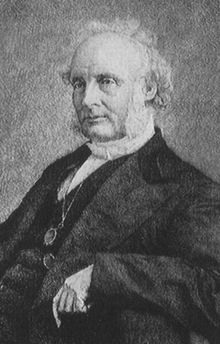James McCosh
| James McCosh | |
|---|---|
 |
|
| President of Princeton University | |
|
In office 1868–1888 |
|
| Preceded by | John Maclean, Jr. |
| Succeeded by | Francis Landey Patton |
| Personal details | |
| Born |
April 1, 1811 Ayrshire, Scotland |
| Died | November 16, 1894 (aged 83) Princeton, New Jersey |
| Children | A. J. McCosh |
James McCosh (April 1, 1811 – November 16, 1894) was a prominent philosopher of the Scottish School of Common Sense. He was president of Princeton University 1868-1888.
McCosh was born of a Covenanting family in Ayrshire, and studied at the Universities of Glasgow and Edinburgh, obtaining his M.A. at the latter, at the suggestion of Sir William Hamilton, for an essay on stoicism. He became a minister of the Established Church of Scotland in 1834, serving as pastor first at Arbroath and then at Brechin. He sided with the Free Church of Scotland in the Disruption of 1843, becoming minister at Brechin's new East Free Church. In 1850 or 1851 he was appointed Professor of Logic and Metaphysics at Queen's College, Belfast (now Queen's University Belfast).
In 1868 he travelled to the United States to become president of the College of New Jersey (now Princeton University). He resigned the presidency in 1888, but continued to teach philosophy until his death. McCosh Hall (home of the English department) and a cross-campus walkway are named in his honor. The campus infirmary is named after his wife, Isabella McCosh. A school on the South Side of Chicago was named after him, but has since been renamed the Emmett Louis Till Math & Science Academy.
McCosh's position was mainly in the tradition of Thomas Reid and other Scottish common-sense philosophers. He denied that our beliefs about the nature of the external world rest on causal or other inferences from perceptual ideas, but held that they are the direct accompaniments of sensation, and thus not open to question. He also argued for the a priori nature of fundamental principles such as those of causality and morality. Our judgements and other cognitions are regulated by such principles, though that is not to say that everyone is aware of them; they can be reached through reflection on our experience, when they are recognised as self-evidently necessary. In his moral theory, especially, McCosh differed from many of his contemporaries in being relatively uninfluenced by Kant.
...
Wikipedia
